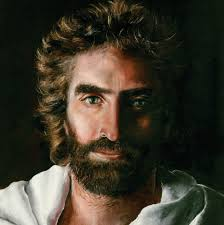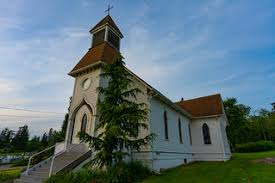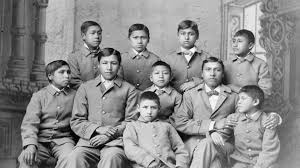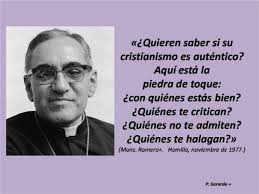______________________________________
Today we celebrate the first of three scrutinies for the elect of our RCIA class. The second and third scrutinies will be celebrated next Sunday and the one after.
When we think of the
word scrutiny, what comes to mind?
The dictionary defines
the word “scrutiny” as a critical examination.
How often do we do that
in our own lives? Daily? Weekly? Monthly? Only in the confessional? Never?
The 20 Elect of Our Lady
of Hope are being asked to do this sort of examination of their own sinfulness
through a process of purification and enlightenment as they prepare to come
into the Church at Easter.
But we are all called to
do this regularly as members of the body of Christ. Because someday we may meet
Jesus in the resurrected flesh and we want to be ready.
Don’t we all long to meet Jesus face-to-face?
The Samaritan Woman at
the Well in today’s Gospel was blessed with such an experience. But she quickly
learned that Jesus can look deep inside our souls to see our sinfulness.
Lent is a time for us to
probe our sinfulness, both personal and as a society.
Would we be ready for a
face-to-face encounter with Jesus? Are we aware of the depths of our own
sinfulness? Or do we see ourselves as perfect Christians who would pass the
test of such an encounter?
I believe this is good spiritual food for thought for us to wrestle with during our Lenten journey.
On the topic of societal sin (and in solidarity with our newly paired St. Anne’s Mission Church on the Tulalip Reservation), the Catholic Church in Washington recently released an extensive report on its history working with the Native American tribes of the state, detailing the Church’s role in Indian Boarding Schools. The details of the report are not known to us, only given to Tribal leaders to be shared with each community. In time, we will come to know the full story, the whole truth.
Sadly, much of our Church’s
history with North American Indians was quite tragic. But more importantly, the culturally accepted attitudes and beliefs that drove the Church’s misguided
treatment revolved around the sinfulness of the time.
Most of the Priests and
nuns from the 1500s to the mid-1900s saw the Indian as a lesser being. Not as
an equal human to learn from as we deepen our own faith journey. The words used
in their diaries confirm this fact (uncivilized, savages, filthy, ignorant…).
Back in the day, most believed in a concept promulgated by the originator of the Indian Boarding Schools system (a Civil War Army officer named Richard Henry Pratt) who said you needed to “kill the Indian, save the man.” In other words, kill the Indian spirit inside each indigenous person to save the human inside.
This concept was not
seen as sinful by the priests and nuns of the time. Instead, it was seen as
logical and true.
Much like the Samaritan
Woman at the Well, they were so comfortable in their own sinfulness they didn’t
see the flaw in how they saw themselves and others.
Now, to be fair, this
was the conventional thinking among most white settlers of the time, born from
decades of conflict between settlers and the tribes.
The doctrine “kill the Indian,
save the man” meant children were taken from their Indigenous families and
forced to travel hundreds, even thousands of miles away to schools initially
run by the Catholic Church and other religious communities.
There, Indian children
were given English names, forced to cut their hair — which was a deeply
significant cultural insult — and forbidden to speak their native languages.
Many children were subjected to beatings, starvation, even sexual abuse in these schools. Most of the schools were run by Catholic priests and nuns, until the U.S. Government took over in the 20th Century.
The Indians were taught
English, basic Christianity and other things.
Conditions in many
schools were appalling. There, children died of disease, starvation and abuse
at the hands of religious missionaries.
Recent news coverage of
Indian boarding schools said the schools were designed "not to
educate" Native children, "but primarily to break their link to their
culture and identity… what is now best be described as 'cultural
genocide.'"
And Jesus wept.
Thankfully, we have come
a long way in our thinking.
As most of you know, the
first principle of our Catholic Social Teaching is the “Life and Dignity of the
Human Person.” These teachings transformed our faith throughout the 20th
Century.
When the horrors of the Canadian Indian Boarding Schools were revealed a few years ago, including the shocking discovery of Mass graves of children who died there, Pope Francis traveled to Canada to make a formal apology to the First Nation Peoples on Canadian soil.
Pope Francis spoke in
the language of the tribes, saying, "I am sorry.” And then he said, “I humbly beg forgiveness
for the evil committed by so many Christians against the Indigenous peoples."
In January, the Washington State Catholic Conference —comprised of the five Catholic Bishops of Washington state— released its commissioned-study of diocesan archival records documenting Catholic Indian boarding school history.
The archives released to the Tribes include an additional review of Jesuit, Sisters of Providence, and other religious order archives.
Again, this report was given to tribal leaders throughout the state to be shared within their communities.
We, the Church, have
much to atone for in our relations with the Tribe. We must walk carefully and
thoughtfully into this future. It is a part of our future as a parish community
(now that we are paired with St. Anne’s Mission on the Tulalip).
So, what does all this
have to do with today’s Gospel?
Just as people long ago were blind to their own sinful, culturally accepted attitudes and beliefs, we, too, need to ask ourselves, what sinful, culturally accepted attitudes and beliefs do we carry today in our hardened hearts? What sinful, culturally accepted attitudes and beliefs of today will horrify people 100 years from now.
This is both a personal
and societal challenge. And not an easy one.
When we have a
face-to-face encounter with Jesus, what sinfulness will he reveal to us? Are we
ready to have Jesus look deep into our souls and uncover what is holding us
back from an even closer relationship with him and each other? What can we do now
to reconcile our words and actions from these attitudes and beliefs?
I know this is a bitter
pill to swallow. But Jesus calls us all closer to him by shedding our sinful
thoughts, attitudes and behavior. Especially during Lent. (And especially the elect
as they prepare to enter our Church).
He knows that like our
first reading from Exodus, we, too, will grumble, quarrel with each other, and
test the Lord.
That’s why the place where Moses found water in today’s scripture is called Massah and Meribah, words that mean “testing” and “quarrelling.” God the Father knows us well.
St. Paul has the
antidote for all of this as we move forward with what may be stirring in our
hearts. In today’s reading, he encourages us to put our whole trust in Jesus and
Jesus alone. Only then can we overcome our sinfulness. Jesus died for that
sinfulness. Jesus knows us well.
My sisters and brothers,
we all thirst for the living water Jesus speaks of today. We all long to wander out of the desert of our
own slavery to sin (like the Israelites) to find the new life offered by Jesus.
We all long to have a face-to-face encounter with the Lord.
Let us call upon the Holy
Spirit’s help as we make it our constant work to prepare our hearts for that
day.
___________________________________________
(A different homily for the Spanish speaking community)
HOMILÍA – Tercer Domingo de Cuaresma – Segundas Oportunidades
Hoy celebramos el
primero de tres escrutinios para los elegidos de nuestra clase de RICA. El
segundo y tercer escrutinio se celebrarán el próximo domingo y el siguiente.
Cuando pensamos en la
palabra “escrutinio”, ¿qué nos viene a la mente?
El diccionario define la
palabra “escrutinio” como un examen crítico.
¿Con qué frecuencia hacemos eso en nuestras propias vidas? ¿Diariamente? ¿Semanalmente? ¿Mensualmente? ¿Nunca?
A los elegidos se les
pide hacer este tipo de examen sobre su propia pecaminosidad a través de un
proceso de purificación e iluminación mientras se preparan para entrar a la
Iglesia en la Pascua.
Pero todos estamos
llamados a hacer esto regularmente como miembros del Cuerpo de Cristo. Porque
algún día podemos encontrarnos con Jesús en su carne resucitada, y queremos
estar listos.
Este fin de semana
escuchamos una historia poderosa sobre el Dios de las segundas oportunidades.
Jesús está en el pozo
con una mujer samaritana que ha estado casada cinco veces y ahora vive con un
sexto hombre. Los samaritanos eran odiados por los judíos en tiempos de Jesús.
Ningún hombre solo hablaría con una mujer. Mucho menos con una mujer samaritana.
Esta mujer sería despreciada por los discípulos de Jesús.
Aun así, Jesús se toma
el tiempo de hablar con ella y, en ese encuentro, le ofrece un nuevo futuro. Un
futuro nacido de una relación con Él, el Hijo de Dios y fuente de agua viva. El
Dios de las segundas oportunidades.
Jesús también está
enseñando algo importante a todos sus discípulos.
En nuestra cultura
actual, todo gira en torno a la movilidad hacia arriba.
Conseguir un mejor
trabajo. Vivir en una casa más grande. Conducir un auto más lujoso.
En el Reino, todo se
trata de la movilidad hacia abajo.
Unirse a los pobres y
marginados. Servir a las personas sin hogar, a los indocumentados, a los
presos, a los rechazados, a los enfermos y moribundos, al forastero. Rechazar
los adornos de una cultura distorsionada de comodidad y privilegios.
En el Reino, todos
estamos llamados a no juzgar, sino solo ofrecer misericordia en nuestras
interacciones con los demás.
Esto es lo que Jesús
hace en el Evangelio de hoy.
¿Dónde estamos nosotros en esta escala de movilidad hacia arriba? ¿Aceptamos el
concepto de movilidad hacia abajo?
Mañana, lunes, recordamos la vida de uno de los santos más recientes de la Iglesia Católica: San Óscar Romero, obispo y mártir.
Fue canonizado el 14 de
octubre de 2018.
Con Maryknoll, tuve la
bendición de peregrinar a San Salvador, El Salvador, para la primera
celebración oficial de la fiesta de San Óscar Romero: el 24 de marzo de 2019.
El arzobispo Óscar
Romero fue asesinado el lunes 24 de marzo de 1980 mientras celebraba la Misa en
una capilla cercana a su casa.
El 24 de marzo solía ser
un día de recuerdo triste. Ahora es un día de celebración por uno de los santos
modernos de la Iglesia.
Tuve el honor de
celebrar Misa varias veces en la capilla del Hospitalito, donde terminó la vida
de San Romero.
La primera vez fue con
Maryknoll en 2013. Durante el rezo del Padre Nuestro, me di cuenta de que
estaba parado exactamente en el lugar donde cayó el cuerpo de Romero y murió
tras recibir la bala de un francotirador. Fue un momento poderoso de reflexión
para este diácono recién ordenado.
Óscar Romero creció en
una familia de clase media y se formó como sacerdote en Roma.
Cuando fue nombrado
Arzobispo de San Salvador, muchos pensaron que mantendría el statu quo, donde
los ricos se aprovechaban de los pobres en la sociedad.
Había sido obispo
auxiliar en San Salvador y obispo de la empobrecida diócesis de Santiago de
María, y no se le recordaba como un defensor de los pobres durante esos cargos.
Pero un acontecimiento
importante al inicio de su ministerio pastoral en El Salvador cambió su
perspectiva. Tres semanas después de ser instalado como Arzobispo de San
Salvador en 1977, su querido amigo sacerdote jesuita fue brutalmente asesinado
en la cercana comunidad de Aguilares junto con otros dos salvadoreños: un joven
y un anciano.
Desde el principio se sospechó de la Junta Militar que gobernaba.
El padre Rutilio Grande
fue un defensor abierto de los derechos de los campesinos y predicaba contra la
injusticia y la opresión de su comunidad pobre.
Fue el primer sacerdote
asesinado antes de la Guerra Civil salvadoreña, que duró una década. Muchos
otros sacerdotes morirían durante esa guerra. Algunos de ustedes aquí tal vez
son de El Salvador y recuerdan esos horrores.
Hace tres años, el Padre
Rutilio Grande fue beatificado en San Salvador por el Cardenal Gregorio Rosa
Chávez.
Caminamos cinco millas
en procesión por las calles de San Salvador hacia la primera Misa de la fiesta
de San Óscar Romero en 2019, con el Cardenal Gregorio, quien fue tratado como
una estrella de rock por los jóvenes que le pedían selfies. Fue algo digno de
ver.
El Cardenal Gregorio fue
obispo auxiliar de Romero y fue ignorado diecisiete veces para ascensos hasta
que el Papa Francisco lo elevó a Cardenal en 2017.
Una señal de amor del
Dios de las segundas oportunidades.
En cuanto a Romero, su
segunda oportunidad llegó cuando mataron a su amigo, y tuvo que elegir: ¿los
pobres y marginados?
¿O los ricos y
poderosos? ¿Movilidad hacia arriba? ¿O hacia abajo?
Al convertirse en la voz
de los pobres, sabía que algún día podría sufrir el mismo destino que su amigo
jesuita.
Pero fue entonces cuando
sus palabras se volvieron poderosas y proféticas.
En la homilía que
pronunció momentos antes de su ejecución tres años después, San Romero dijo:
“Muchos no entienden y piensan que el cristianismo no debe involucrarse en estas cosas (como defender a los pobres). Pero, al contrario, acaban de oír el Evangelio de Cristo, que uno no debe amarse tanto a sí mismo como para evitar involucrarse en los riesgos que la historia nos exige, que quien quiera evitar el peligro perderá su vida, mientras que quien por amor a Cristo se entrega al servicio de los demás vivirá, como el grano de trigo que muere, pero solo en apariencia. Si no muriera, quedaría solo. La cosecha llega porque muere, se sacrifica en la tierra y se destruye. Solo destruyéndose produce la cosecha.”
Momentos después de esta homilía, una bala asesina le atravesó el corazón mientras levantaba el cáliz al inicio de la plegaria eucarística.
Murió en los brazos de
las monjas que dirigían el hospital y la capilla del hospital.
Dios nos llama a morir a
nosotros mismos y resucitar en Él.
No cabe duda de que Óscar Romero sabía que podía morir por decir la verdad al
poder. Y así es también con todos nosotros.
También estamos llamados a no ser movidos hacia arriba, sino hacia abajo. No
buscar las cosas más altas, sino aceptar las cosas que pueden traer sufrimiento
y desesperación.
Es la única forma de
caminar con Jesús y encontrar nuestra salvación.
Today we celebrate the
first of three scrutinies for elect of our RCIA class. The second and third
scrutinies will be celebrated next Sunday and the one after.
When we think of the
word scrutiny, what comes to mind?
The dictionary defines
the word “scrutiny” as a critical examination.
How often do we do that in our own lives? Daily? Weekly? Monthly? Never?
The elect are being
asked to do this sort of examination of their own sinfulness through a process
of purification and enlightenment as they prepare to come into the Church at
Easter.
But we are all called to
do this regularly as members of the body of Christ. Because, someday we may
meet Jesus in the resurrected flesh and we want to be ready.
This
weekend we hear a powerful story about the God of second chances.
Jesus
is at the well with a Samaritan woman married five times and in a relationship
with a sixth man. Samaritans were hated by Jews in Jesus’ time. No male alone
would talk to a woman. Let alone a Samaritan woman. This one would be reviled by
Jesus’ disciples.
Still,
Jesus takes the time to talk to her and in the encounter offers her a new
future. A future born out of a relationship with him, the Son of God and source
of living water. The God of second chances.
Jesus also
is demonstrating something important to all his disciples.
In our
current culture today, it’s all about upward mobility.
Finding
the better job. Living in the bigger house. Driving the fancier car.
In the
kingdom, it’s all about downward mobility.
Uniting
with the poor and marginalized. Serving the unhoused, the undocumented, the
prisoner, the outcast, the sick and dying, the stranger. Rejecting the
trappings of a warped culture of comfortability and entitlement.
In the
Kingdom, we are all called to never render judgement but only offer mercy in
our interactions with others.
This
is what Jesus is doing in today’s Gospel.
Where
are we on this upward mobility spectrum? Do we embrace the concept of downward
mobility?
Tomorrow
(On Monday) we remember the life of one of the newer saints in the Catholic
Church: Saint Oscar Romero, Bishop and Martyr.
He was
canonized October 14, 2018.
With
Maryknoll, I was blessed to pilgrimage to San Salvador, El Salvador, for the
first official celebration of St. Oscar Romero’s feast day: March 24, 2019.
Archbishop
Oscar Romero was assassinated on Monday, March 24th, 1980, while celebrating
Mass at a chapel near his home.
March
24th used to be a day of sad remembrance. Now it is a day of celebration for
one of the Church’s modern-day saints.
I had the honor to celebrate Mass at the
Hospitalito chapel where St. Romero’s life ended several times.
The
first time was with Maryknoll in 2013. During the recitation of the Our Father,
I realized I was standing on the exact spot where Romero’s body fell and he
died after being shot by a sharpshooter’s bullet. It was a powerful moment of
reflection for this newly ordained deacon.
Oscar
Romero was brought up in a middle-class family and was formed as a priest in
Rome.
When
he was made Archbishop of San Salvador, many thought he would maintain the
status quo where the rich took advantage of the poor in society.
He had
been an Auxiliary Bishop in San Salvador and Bishop of the impoverished Diocese
of Santiago de Maria and was not remembered as a champion of the poor during
those assignments.
But a
major event early in his tenure as the pastoral leader of El Salvador changed
his perspective. Three weeks after being installed as Archbishop of San
Salvador in 1977, his dear Jesuit priest friend was brutally murdered in the
nearby community Aguilares along with two other Salvadorans, a teenage boy and
an elderly man.
The ruling
military Junta was suspected from the start.
Fr.
Rutilio Grande was an outspoken proponent of peasants’ rights and preached
against injustice and oppression of his poor community of campesinos.
He was
the first priest to be assassinated prior to the decade-long Salvadoran Civil
War. Many other priests would be killed during that Civil War. Some of you here
may be from El Salvador and remember these horrors.
Three
years ago, Fr. Rutilio Grande was Beatified in San Salvador by Cardinal
Gregorio Rosa Chavez.
We
walked for five miles in a parade through the streets of San Salvador to the
first Feast Day Mass for St. Oscar Romero in 2019 with Cardinal Gregorio who
was treated like a rockstar by young people asking to take selfies with him. It
was quite a sight.
Cardinal
Gregorio was Archbishop Oscar Romero’s Auxiliary Bishop and was passed over
seventeen times for promotion before Pope Francis elevated him to Cardinal in
2017.
A sign
of love from the God of second chances.
As for
Romero, his second chance came when his friend was killed, and he had to
choose: the poor and marginalized? Or the rich and powerful? Upward mobility?
Or downward mobility?
By
becoming the voice of the poor he knew someday he might suffer the same fate as
his Jesuit friend.
But that is when his words became powerful and
prophetic.
In the
homily he delivered moments before his execution three years later, St. Romero
said,
“Many
do not understand, and they think Christianity should not get involved in such
things (as championing the poor). But, to the contrary, you have just heard
Christ's Gospel, that one must not love oneself so much as to avoid getting
involved in the risks of life which history demands of us, that those who would
avoid the danger will lose their life, while those who out of love for Christ
give themselves to the service of others will live, like the grain of wheat
that dies, but only apparently. If it did not die, it would remain alone. The
harvest comes about because it dies, allows itself to be sacrificed in the
earth and destroyed. Only by destroying itself does it produce the harvest.”
Moments
after delivering this homily, an assassin’s bullet pierced his heart as he
lifted the chalice during the beginning of the Eucharistic prayer.
He
died in the arms of the nuns who ran the hospital and hospital chapel.
God
calls us to die to ourselves and rise again in him.
No
doubt Oscar Romero knew that he might die for speaking truth to power. And so,
it is with all of us.
We,
too, are called not to be upwardly mobile, but downwardly mobile. Not to seek
the higher things. But accept the things that can lead to suffering and
despair.
It’s the
only way to walk with Jesus and find our salvation.













